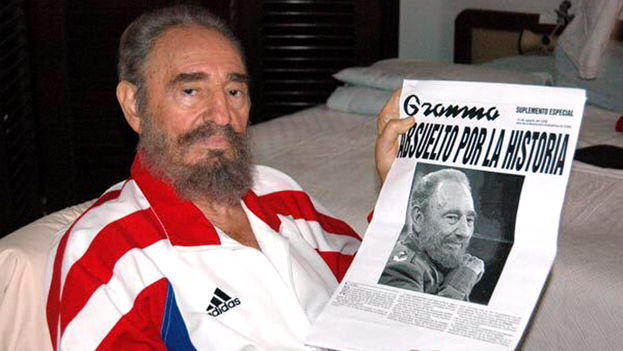
14ymedio, Mario Penton, Miami, 27 December 2016 — The Cuban parliament unanimously approved a bill on Tuesday stating that the name of the deceased former president Fidel Castro cannot be used to designate public spaces and it is forbidden to market his image.
“They want to keep the image of Fidel Castro with that halo of mystery that always characterized him. They were in charge of presenting him to the people as a superman, about whom we had little information regarding his private life; we have to pay attention because they could be trying to maneuver into converting him into one more national symbol,” said the columnist Miriam Celaya from Havana. “They don’t want it to be the same as what happened with Ernesto (Che) Guevara,” she said.
Che’s image has been indiscriminately commercialized and turned into a symbol of rebelliousness and belonging by the entire world’s left wing movements. You can find everything from underpants to national flags with his image. In Cuba, a good share of the handicrafts sold to tourists bears the image of the Argentinian guerilla.
The law, the discussion of which had been announced at Castro’s funeral rites, supposedly corresponds to the will of the deceased, who asked that his name not be used for plazas and avenues, and also prohibits the raising of statues or the minting of coins with his image.
Although the deputies believed that Castro deserved “these traditional forms of homage, or even greater ones,” they decided to abide by his will as proposed by his brother, Army General and President Raul Castro.
“Only the sacred respect for his will, an expression of the humility and modesty that characterized him, and the fact that he always honored Marti’s preaching that all the glory of the world fits into a kernel of corn, leads us to adopt a legal text of such nature,” said the deputies, according to the official press reports.
The National Assembly, however, excepts the use of the name of Castro for the creation of some educational institution on “his invaluable trajectory.”
“They want to avoid the fact that once the tyranny is destroyed, his statues would be torn down by a free country,” says José Daniel Ferrer, leader of the Patriotic Union on Cuba (UNPACU), an opposition organization in the east of the island.
For Ferrer, the approved law seeks to “justify” the cult of personality that the government has imposed on the nation, a cult that the UNPACU leader describes as “sick.”
“The country has been filled with his images and slogans for decades. As Castro knew, when tyrants fall their symbols disappear; it seems he wanted to avoid a spectacle like what happened in the former USSR,” he commented.
For Elisa Valdés, a housewife in Cienfuegos province, the law puts the name of Fidel almost on a par with that of God. “It’s like it’s sacred,” she says on the phone. Instead of “you will not take the name of God in vain, we will now have to say: you will not take Fidel’s name in vain,” she says wryly.
The legislation also prohibits “the use of names, images or allusions of any nature referring to the figure of the Commander in Chief Fidel Castro Ruz for use as a trademark or other distinctive signs, domain names and designs for commercial or advertising purposes.”
It is not clear if all the artistic photos and images of Fidel Castro that are sold in the tourist areas, from postcards recalling the deceased leader to T-shirts with his effigy, will be eliminated.
According to the Cuban press, it would be a question of “avoiding the use of the figure of the leader of the Revolution in commercial traffic or for commercial advertising purposes,” although it would not limit artistic use or the photographs and banners used up until now in state companies, walls, propaganda billboards, and even stones on the edges of the streets.
“For all those who are grateful that they will always accompany compañero Fidel, the homages they render him will be few,” said the more than 600 deputies who make up the unicameral body, speaking in the last session of this year.
